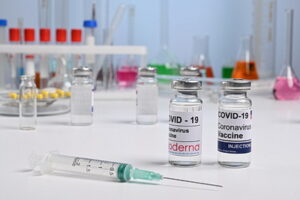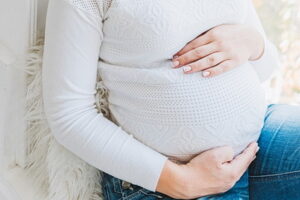We have previously learned how these vaccines work. Now let’s delve a bit deeper into each of them starting with the Moderna vaccine.
The Food and Drug Administration (FDA) approved the emergency use of the Moderna COVID-19 vaccine On December 18, 2020. That made it the second vaccine after Pfizer in the U.S. to fight against the COVID-19 pandemic. There are a few differences though, so let’s take a look at how they differ and what you need to know about the Moderna vaccine.
#1. What is Moderna COVID-19 Vaccine?

So far, the FDA has not approved any vaccine to prevent the spread of COVID-19 for general use (only for emergency use). The Moderna vaccine is authorized for use in adults aged 18 and above under an Emergency Use Authorization (EUA).
The Moderna vaccine for COVID-19 is injected into the muscle, and two doses are administered one month apart.
#2. What Should You Tell Your Vaccination Provider Before You Get the Moderna COVID-19 Vaccine?

Your vaccination provider needs to know the details of any medical conditions and allergies that you may have. You must share the following information with your vaccination provider before you get your first shot.
- Any allergies that you may have,
- Any bleeding disorders (or any medications that you may be using such as blood thinners),
- If you are immuno-compromised or are taking any medications that may affect your immunity,
- If you have any metabolic/chronic health conditions, such as diabetes,
- If you are pregnant, plan to become pregnant, or are breastfeeding,
- Have you received an initial dose of another vaccine for COVID-19?
Your vaccination provider may ask you for some more details depending upon your age and medical history.
#3. Is Moderna Vaccine Safe for Children?
So far, children have rarely developed severe forms of COVID-19, and deaths among children from the virus are even rarer. Moreover, parents are still reluctant to include their children in the clinical trials for the COVID-19 vaccine. However, given the emergence of new and fast-spreading variants, younger children may contribute to the spread of the virus. Thus, it is integral that young children are offered immunization.
The Moderna vaccine is considered safe for adults over the age of 18. However, the new trials among children include kids as young as 12 years old. Therefore, there is no evidence for the safety of the vaccine among children.
#4. Is Moderna Vaccine Safe for Pregnant and Lactating Women?

Pregnancy can significantly increase the risk of severe COVID-19. However, there is limited data on whether the Moderna vaccine is safe for pregnant women.
Pregnant women have not been actively involved in clinical trials. Moreover, breastfeeding mothers were also not part of the trials, so there is no numerical evidence on the safety of the Moderna vaccine for COVID-19 for lactating mothers (and their children).
However, since pregnancy increases the risk of severe COVID-19, the WHO recommends that it’s in your best interest to take the vaccine if you are pregnant and have other health conditions. Moreover, the WHO recommends offering the Moderna vaccine for breastfeeding women; however, the organization does not recommend quitting lactation following the vaccination.
If you are pregnant or lactating and have not yet received the vaccine, it is best to contact your healthcare provider and find out the best choice for yourself.
#5. What are the Risks of the Moderna Vaccine for COVID-19?
Similar to the Pfizer vaccine, the risks are about the same. There is little chance that the Moderna vaccine can cause a severe allergic reaction, a condition that occurs within the first few minutes after getting the shot.
The condition can be treated, and that’s exactly why your medical provider may ask you to stay at the vaccination center for a while so they can monitor your condition after vaccination. Some of the signs of a severe allergic reaction include:
- Difficulty in breathing,
- Swelling on face and throat,
- Palpitation or increased heart rate,
- Rashes over the body, and
- Dizziness and weakness.
Apart from these signs of a severe allergic reaction, and similar to the side effects of the Pfizer vaccine. It is possible but not guaranteed that individuals who get the Moderna vaccine will experience the following side effects.
- Pain on the site of injection,
- Swelling or tenderness in the arm,
- Fatigue,
- Muscle ache,
- Joint pain,
- Headache,
- Nausea and vomiting, and
- Chills
Some people complained about headaches and fatigue, which appeared to be the most common side effects, while others have said that they felt nothing after the shot. These cases ranged between males and females, people of ages 20 – 70, and from a variety of ethnic groups. Of these, there were seniors who didn’t feel any side effects, while some millennials claimed to have headaches and others were fatigued.
Although some think that one’s immune system was a help to inhibit the side effects, there is no guarantee that that is the case. Right now, there is no rhyme or reason why some humans are affected and others not. Additionally, for those that were affected, they tended to feel better after 24 hours.
#6. Who Should Not Get the Moderna Vaccine for COVID-19?
You should not get the Moderna vaccine for COVID-19 if you;
- Developed a severe allergic reaction after receiving the first dose of the vaccine,
- Are allergic to any of the ingredients of the Moderna vaccine for COVID-19.
Key Takeaways
The Moderna vaccine for COVID-19 is the second vaccine that has been authorized for emergency use by the FDA. So far, there is no evidence about the safety of the drug among children under the age of 18. However, trials for children aged 12 and above have started.
While pregnant and lactating women were not actively involved in the trials, the Moderna vaccine for COVID-19 does not appear to cause any serious risks for pregnant and lactating women. However, it’s best to discuss your health conditions with your primary caregiver before getting the shot.
